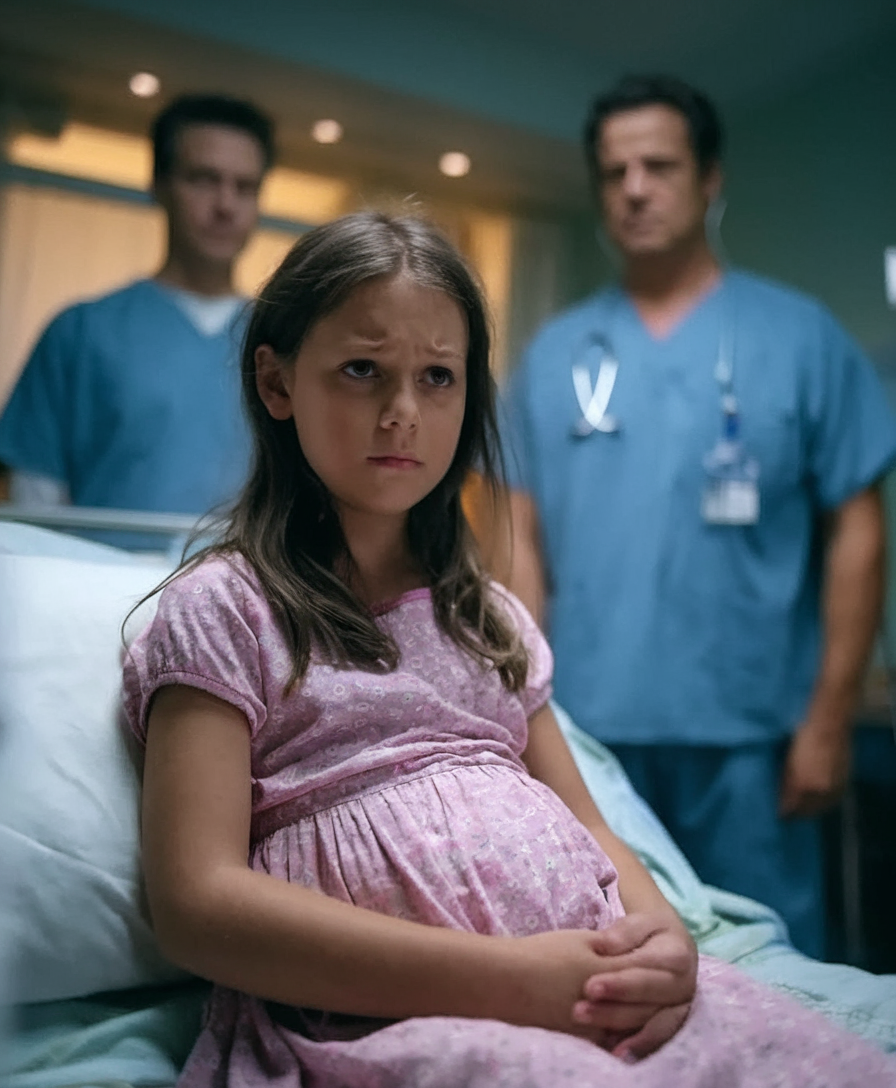Kira was only twelve when her world took a sudden and terrifying turn. A quiet girl with wide eyes and gentle hopes, she had always been healthy—until the day her stomach began to swell. At first, her mother dismissed it as a stomach bug, maybe something she’d eaten. But as the days passed, the swelling grew worse. Kira’s pain became so severe that even sitting upright brought her to tears.
Her once-flat belly became tight and distended. Something was clearly very wrong.
Kira’s mother—a single mom working two cleaning jobs—knew she couldn’t afford to waste time or money. She gathered the little they had, gripped her daughter’s hand, and boarded a shaky old bus to the nearest hospital, more than an hour away. The ride was quiet but heavy with silent prayers and buried fear. Her mother didn’t cry. She couldn’t. Kira needed her strength, not her sorrow.
At the hospital, the doctors ran tests, scans, and exchanged worried looks. When the diagnosis came, it stunned them all: intestinal lymphangiectasia—a rare, serious condition. Her body was leaking proteins and lymphatic fluid into her abdomen. If left untreated, it could be fatal.
The treatment would be long, expensive, and overwhelming—surgery, injections, a lifetime of strict dietary rules. For a family with no health insurance, it felt like climbing a mountain without a map. But through it all, Kira never once asked, “Why me?” She smiled through the pain, thanked the nurses, and whispered words of comfort to her mother late at night.
And when the pain in her gut was too much to bear, Kira would close her eyes and imagine a different future—not as the one lying in the hospital bed, but the one standing beside it. She didn’t want to fight pain with anger. She wanted to fight it with healing. That’s when she made a choice: one day, she would become a doctor.
School was brutal. The medications altered her appearance—she was thin, pale, with a face puffed by steroids. Other kids weren’t kind. They mocked her, gave her names like “Balloon Girl” and “Alien Face.” She cried alone in bathroom stalls. But she never stopped showing up. She studied during hospital stays, memorized vocabulary hooked up to IVs, and wrote scholarship essays under the flicker of a bare bulb in their cramped one-bedroom apartment.
Her mother never stopped working—scrubbing floors, folding linens, wiping windows until her fingers bled. Every aching limb and sleepless night became worth it the day Kira received a full scholarship to medical school.
That’s when her story took another turn.
One freezing November night, a fire alarm screamed through the dormitory. Most students ran, but Kira heard screams from the third floor. Smoke was everywhere. A bookshelf had fallen, pinning another student to the ground. Without a second thought, Kira ran toward the fire. She pulled the girl free, coughing and trembling, guided by nothing but instinct and will.
The story made the news, but Kira refused the spotlight. She didn’t do it for glory. She did it because someone needed help. And that, for her, was enough.
Years passed. She graduated. She earned her white coat—not with pride, but with purpose.
She didn’t seek easy cases. She volunteered for the hardest shifts. She sat beside dying patients. Held the hands of frightened mothers. Whispered reassurance to those waiting for answers. She remembered what it felt like to be the one on the other side. And that memory gave her strength.
Then, one day, a mother walked into her clinic holding a little girl with a swollen belly and pale skin. Her chart was full of uncertainty.
Kira listened. Examined the girl. And her heart sank—because she recognized it immediately.
After the tests confirmed her suspicion, Kira sat beside the mother and said, “Your daughter has intestinal lymphangiectasia.”
The woman froze. Her lips trembled. But before the tears came, Kira reached out, took her hand, and said gently, “I had it too—when I was her age. I know how frightening this is. But I promise you… she can get through it. I did.”
The mother broke down. But Kira didn’t.
Not until weeks later—when another woman entered her office. One of her former patients.
This time, she brought her newborn daughter with her.
“I wanted you to meet her,” she said, beaming. “Her name is Kira.”
And that’s when the tears came.
Not from pain.
But from joy.
Because in that moment, Kira finally understood—survival isn’t just about staying alive. It’s about becoming something more. She had turned her pain into purpose, her scars into strength, her suffering into compassion.
She didn’t just survive.
She became a symbol.
A guide.
A light in the dark.
And that made all the difference.
